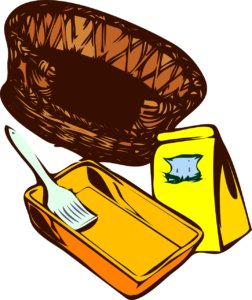
Litter Train Your Ferret
Litter training a ferret is easy with a little patience and understanding. Set up a litter box in your ferret’s cage, using litter that’s safe for ferrets. Train your ferret using positive reinforcement. Keep the litter box clean, as a ferret is unlikely to use a dirty litter box.
Setting Up the Litter Box
1. Choose a litter that’s safe for ferrets. Not all litters are safe for ferrets. Ferrets have a tendency to roll in or sniff their litter and many ferrets have very sensitive respiratory systems; therefore, a dust-free, unscented litter that does not clump is safest for ferrets. Denatured wood litter pellets, recycled newspaper pellets, and alfalfa pellets all make good litters. You can use cat litter if it’s un-clumping and unscented in a pinch if you run out of regular litter. You can also use shredded newspapers. Avoid cedar and pine shavings as litters. The chemicals can irritate your ferret’s eyes.
2. Pick a big enough litter pan. Your ferret should be able to fit all four of its paws in the litter pan comfortably, so make sure to pick a box or pan that’s big enough. You also want a litter pan or box with lower sides. Ferrets will have an easier time getting in and out of a litter pan with lower sides.
3. Place your litter box in your ferret’s cage. You want to start litter training in the ferret’s cage. Set the litter box in the corner of the ferret’s cage. Fill it with your chosen litter. Make sure you don’t use the litter anywhere else in the cage. You want it to be clear to your ferret they need to eliminate in the litter box. 4. Put feces and urine in the litter box. Ferrets are not like cats. They do not instinctively opt to use a litter box; therefore, you need to teach your ferret what the litter box is for. Place some urine and feces in the litter box. The scent will encourage your ferret to go in the area.
4, Litter train your ferret in the cage at first. Keep your ferret their cage when unsupervised until they are litter trained. This is the easiest way to keep accidents contained and teach your ferret to use their litter box. Keep your ferret contained until they are regularly eliminated in the litter box and do not have accidents in other areas of the cage. [5] You should take your ferret out of the cage whenever you can during litter training. You do not want to keep your ferret locked up all the time. Let your ferret out of its cage Whenever you’re able to supervise.

Move accidents to the litter box. Move the accidents to the litter box when you see your ferret has gone outside the litter box. This will teach the ferret this is what the litter box is for. It will also help develop a scent in the litter box. Ferrets are likely to eliminate in areas that smell like urine and feces. Praise your ferret for using the litter box. Ferrets respond to positive reinforcement, so offer your ferret some praise when they use their litter box. Offer them verbal praise once they are done if you catch your ferret eliminating in the litter. [7] You can also give your ferret a small treat for eliminating in the litter box. If your ferret loves a particular type of treat, giving your ferret this treat can help encourage them to use their litter box.
5. Clean the litter box regularly. Your ferret is unlikely to use litter that’s very dirty or smelly. To encourage your ferret to use their litter box, clean the litter box once a day. Use a litter scooper to remove feces and any clumps of urine. Once a week, completely dump the contents of the litter box and replace them with fresh litter.
7. Clean up accidents completely. Even after your ferret is using its box regularly, it may have an occasional accident outside the box. A ferret is more likely to eliminate there again if an area smells. To prevent this, clean up accidents completely after they happen. [9] Treat the stain as quickly as possible. You need to thoroughly deodorize the area or the ferret will be drawn back to this spot and will think it is an appropriate place to eliminate.
To prevent reoccurrence, spray something like lemon or apple bitters near the spot. Ferrets dislike these smells and will be discouraged from going in these spots again.

8. Fasten your litter box to the cage if your ferret digs a lot. Ferrets may dig in their litter box. This can cause the box to slide around the cage, making the ferret more likely to eliminate outside of the cage. Drill holes in the litter box and attach it to the side of the cage using wire if your ferret is pushing their litter box around. [10] Make sure the sharp ends of the wire are outside of the cage so your ferret does not injure itself.
Put water, food, and toys in areas where your ferret is going to the bathroom. Start putting its toys and food in these areas if your ferret keeps eliminating outside the cage. Ferrets are less likely to eliminate near where they eat, sleep, and play. Having food, toys, and bedding in the places where your ferret has accidents will discourage future accidents.
Do not scold a ferret. Ferrets, like most animals, do not respond to scolding. If you scold a ferret for going outside its litter box, it’s likely to simply get agitated and stressed. This will not encourage litter box training and will only serve to upset your animal.


